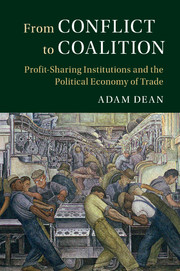Book contents
- Frontmatter
- Dedication
- Contents
- List of Figures
- List of Tables
- Acknowledgments
- 1 Introduction
- 2 A Theory of Profit-Sharing Institutions
- 3 Evidence and Research Design
- 4 The Gilded Wage: Trade Politics in the American Textile and Steel Industries
- 5 Liberalized by Labor
- 6 Trade Politics in Britain and Argentina
- 7 Power Over Profits
- 8 Conclusion
- References
- Index
- Miscellaneous Endmatter
3 - Evidence and Research Design
Published online by Cambridge University Press: 05 September 2016
- Frontmatter
- Dedication
- Contents
- List of Figures
- List of Tables
- Acknowledgments
- 1 Introduction
- 2 A Theory of Profit-Sharing Institutions
- 3 Evidence and Research Design
- 4 The Gilded Wage: Trade Politics in the American Textile and Steel Industries
- 5 Liberalized by Labor
- 6 Trade Politics in Britain and Argentina
- 7 Power Over Profits
- 8 Conclusion
- References
- Index
- Miscellaneous Endmatter
Summary
Chapter 2 developed my theory of how profit-sharing institutions influence workers’ international trade policy preferences. The remainder of this book now seeks to test my theory using a multi-method approach and a variety of different types of empirical evidence. The goal is to combine qualitative and quantitative methods in a way that provides a more rigorous and compelling set of tests than would be possible using only one of these methodological approaches. The qualitative case studies help explore the causal mechanisms that link the various pieces of my theory together. The rich historical evidence uncovered by my archival research helps explain the process through which workers augment their bargaining power, develop profit-sharing institutions, capture a share of increased profits in the form of wages, and come to share the same trade policy preferences as their employers. Overall, these cases demonstrate exactly howprofit-sharing institutions alleviate the uncertainty-surrounding wage bargaining, and align the trade policy preferences of capital and labor. The large-N quantitative analyses, on the other hand, avoid the selection and omitted variable biases that may unintentionally influence the conclusions drawn from studying a small number of qualitative cases. Most importantly, the cross-national statistical analysis demonstrates that the underlying insight at the heart of this book – that the link between trade policy and workers’ wages depends on wage bargaining between capital and labor – is a generalizable phenomenon that influences the political economy of trade far beyond the historical cases examined in this book.
The remainder of this chapter describes the details of this book's research design. It addresses four main issues: operationalizing the dependent variable, the unit of analysis, qualitative case selection, and testing causal mechanisms.
OPERATIONALIZING THE DEPENDENT VARIABLE
The main dependent variable in this book is capital-labor agreement concerning international trade policy. More technically, I seek to explain the conditions under which workers will share the same international trade policy preferences as their employers. In exploring this question, this book adopts the traditional international political economy approach which holds that “an actor's preferences rank the outcomes possible in a given environment.” International trade policy preferences, then, refer to an actor's rank of possible international trade policy outcomes. For example, do workers prefer protectionist or more liberal trade policies? In theory, trade policy preferences could vary on a continuous spectrum from pure protectionism, at one extreme, to pure free trade, on the other.
- Type
- Chapter
- Information
- From Conflict to CoalitionProfit-Sharing Institutions and the Political Economy of Trade, pp. 37 - 52Publisher: Cambridge University PressPrint publication year: 2016



